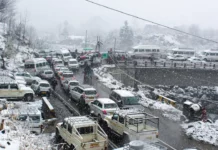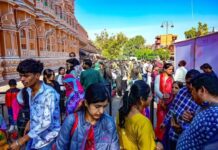KUTCH: Recognizing Dhordo’s outstanding contribution to sustainable tourism, cultural preservation, and rural development, the village in Gujarat’s Kutch district has been awarded with the “Best Tourism Village” title by the United Nations World Tourism Organization (UNWTO), an official statement said.
Dhordo is a serene village nestled within the vast expanse of the Great Rann of Kutch, and is globally acclaimed for hosting the annual Rann Utsav. This vibrant cultural festival serves as a grand stage for the exhibition of the region’s traditional arts, music, and crafts. Visitors from around the world have the unique opportunity to immerse themselves in the local culture against the fascinating backdrop of the Rann of Kutch.
Dhordo’s recognition as the “Best Tourism Village” has far-reaching implications for the region’s economy. The Rann Utsav, an annual extravaganza held in Dhordo, has significantly boosted the local economy. In the fiscal year 2022-23, the event contributed Rs 468 crore in revenue from GST. The festival attracted over 98,000 Indian tourists and 7,400 international tourists, further emphasizing its importance as a key tourism destination.
The local community of Dhordo played a pivotal role in the village’s transformation. Their active participation in cultural preservation, traditional handicrafts, and hospitality services ensures that tourists have an authentic experience while contributing to the local economy.
The government of Gujarat recognized the potential of Dhordo and launched the annual Rann Utsav.
Prime Minister Narendra Modi expressed his delight at Dhordo’s recognition by the UNWTO. He shared his excitement on social media, celebrating the rich cultural heritage and natural beauty that Dhordo embodies He extended an invitation for people to share their memories and experiences in Dhordo, hoping to inspire more individuals to visit this remarkable village.
The UNWTO’s Best Tourism Village award is a prestigious recognition that honours villages for their remarkable achievements across diverse domains.
These encompass rural development, the preservation of their original landscapes, the promotion of cultural heritage and diversity, as well as the safeguarding of local values and culinary traditions.
The evaluation process, which relies on nine key criteria encompassing economic, social, and environmental sustainability, cultural and natural resources, and value chain integration, identifies and celebrates these exceptional rural tourism destinations. (ANI)







